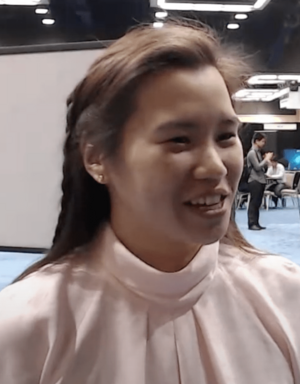Cynthia Sung facts for kids
Quick facts for kids
Cynthia Rueyi Sung
|
|
|---|---|

Sung in 2015
|
|
| Alma mater | Rice University (BS) Massachusetts Institute of Technology (PhD) |
| Scientific career | |
| Fields | Robotics |
| Institutions | University of Pennsylvania |
| Thesis | Computational design of foldable robots via composition (2016) |
| Doctoral advisor | Daniela Rus |
Cynthia Rueyi Sung is an amazing American scientist who builds robots. She is famous for creating "foldable robots." She teaches at the University of Pennsylvania, where she is a professor of mechanical engineering.
Meet Cynthia Sung
Her Early Life and Learning
When Cynthia was a child, her mom taught her origami, the art of folding paper. Later, in high school, she got excited about robots after watching the Mars rovers, Opportunity and Spirit, explore the planet Mars.
Cynthia went to Rice University and earned a degree in mechanical engineering in 2011. She then studied at the Massachusetts Institute of Technology (MIT). In 2016, she earned her PhD in electrical engineering and computer science. Her main teacher there was Daniela Rus.
Building Amazing Robots
While at MIT, Cynthia led a team that created something called the Robogami system. This system makes it easy for anyone, even beginners, to design and 3D print robots. These robots are made from flat pieces that fold up at special connections.
Cynthia continues to improve the Robogami system at the University of Pennsylvania. She is adding better ways for the robots to move and be controlled.
She also invented a cool method called "additive self-folding." With this method, robots start as long, flat strips of a special material. When these strips are put into hot water, they automatically fold themselves into the robot's desired shape! For this amazing work, Popular Mechanics magazine gave her a special award in 2017.
In 2017, the American Society of Mechanical Engineers chose Cynthia to be part of their New Faces of Engineering program. In 2020, she won the Johnson & Johnson Women in STEM²D Scholars Award. This award recognized her work on foldable robots and how they can be used in healthcare and medicine. She also won an award with her team for their work on flying vehicles. These vehicles have wings that can fold and change shape, allowing them to fly like both airplanes and drones.
 | Madam C. J. Walker |
 | Janet Emerson Bashen |
 | Annie Turnbo Malone |
 | Maggie L. Walker |

